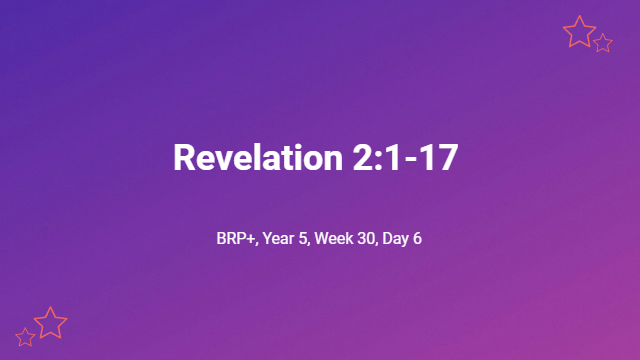Revelation 2:1-17
Q.1. How did the Lord describe Himself to the church at Ephesus? What was God’s complaint and warning? What did He promise the overcomers? – (Rev.2:1-7)
Christ addressed Ephesus, as from – the One who holds the seven stars in His right hand, the One who walks among the seven golden lampstands (Rev.2:1). We are not left to wonder what He meant, because in the previous verse, He explained the seven stars = the angels of the seven churches, and the seven golden lampstands = the seven churches (Rev.1:20). Since there were more than seven churches in Asia Minor at the time John wrote, the seven are understood prophetically to be descriptive of all the churches, namely … (i) In the first century. (ii) Throughout the church age. (iii) In each and every age. The Head of the church controls the angels or messengers of the churches. He is actively watching over and directing His church (see Heb.1:14). Though the church was steadfast in their deeds and watchful in their doctrine, God sent a warning to Ephesus – But I have this against you, that you have left your first love (Rev.2:4). They were substituting religion for their relationship with Christ. He further warned them – Therefore remember from where you have fallen, and repent and do the deeds you did at first; or else I am coming to you and will remove your lampstand out of its place–unless you repent (Rev.2:5). They were commended for resisting the deeds of the Nicolaitans. Since the doctrine of the Nicolaitans was not defined, the name suggests it was the false division of clergy over laity (from Greek nikao = to conquer and laos = people. Church leadership has repeatedly weakened the ‘priesthood of all believers’ (see Rev.1:6; 2:6, 15) For those at Ephesus who responded – To him who overcomes, I will grant to eat of the tree of life which is in the Paradise of God’ (Rev.2:7). Each message included an appeal to heed His warnings – He who has an ear, let him hear what the Spirit says to the churches (Rev.2:7 c.f. 2:11, 17, 29; 3:6, 13, 22).
Q.2. How did the Lord describe Himself to the church at Smyrna? Why was the church commended? What did He promise overcomers? – (Rev.2:8-11)
The church at Smyrna went through acute persecution. Many were martyred for their faith in Christ. This church has ably represented persecuted Christians throughout the ages, and to this very day. The title Christ gave to them was poignant and would give them hope – The first and the last, who was dead, and has come to life (Rev.2:8). The believers were hunted, and therefore often in poverty. They also exposed those who falsely claimed to be God’s people, the Jews. The devil would persecute them for a designated time. They were challenged – Do not fear what you are about to suffer … Be faithful until death, and I will give you the crown of life … He who overcomes will not be hurt by the second death (Rev.2:10-11). Death would not be the destiny of the faithful, but rather they would have the reward of everlasting life. The Head of the church had nothing negative to say to the church in Smyrna.
Q.3. How did the Lord describe Himself to the church at Pergamum? What was God’s complaint and warning? What did He promise overcomers? – (Rev.2:12-17)
The church at Pergamum needed to apply the truth of God’s Word, so Christ described Himself as – the One who has the sharp two-edged sword (Rev.2:12). They were commended because they had held to His name, and had refused to deny their faith in Him, while dwelling in the place of Satan’s throne. Antipas had paid the supreme price for his opposition to the spirit of Satan (see Rev.2:13). When Balaam could not bring a curse against Israel, he encouraged Israel to intermarry with the Moabites. The resulted in the drastic consequences of twenty-four thousand deaths. The number was cut short only by the intervention of the zealous priest Phinehas (see Num.25:1-9). Balaam encouraged King Balak to place a stumbling block before Israel, thus leading them into immorality and Idolatry (see Rev.2:14). Unlike the church at Ephesus, most at Pergamum had given in to the doctrine of the Nicolaitans (see Rev.2:15 c.f. comment in Rev.2:6). Christ’s warning was a stern one – … repent; or else I am coming to you quickly, and I will make war against them with the sword of My mouth (Rev.2:16). His main opposition seemed to be against those Nicolaitans, who were undermining the priesthood of all believers (see Rev.1:6). However, to the faithful He promised – …To him who overcomes, to him I will give some of the hidden manna, and I will give him a white stone, and a new name written on the stone which no one knows but he who receives it (Rev.2:17). A white stone was sometimes given to a loved one when parting. It will be Christ’s gift to His children, with their own new name engraved on it.

